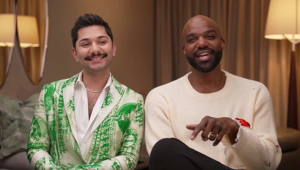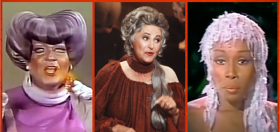 If you’re unfamiliar with the colorful, tragic story of cult entertainer Jobriath, you can’t be blamed. Before the glam rock performer arrived on the music scene with nearly unprecedented hype only to crash and burn almost immediately, he’d already lived a colorful life in which he’d been a child piano prodigy, appeared in Hair, gone AWOL from the military, arrested and confined to a psychiatric hospital. He was eventually signed to a lucrative contract and surrounded by incredible hype as the next big thing and, as a testament to the burgeoning sexual liberation of the era, he never attempted to conceal his sexual orientation. His eponymous debut album received positive reviews but sales were minimal and then he essentially vanished from the public eye. He occasionally performed in cabaret and sometimes worked as a prostitute before he became one of the first noted entertainers to succumb to AIDS when he died in 1983 at age 36. The complex tale caught the attention of filmmaker Kieran Turner, who interviewed many of Jobriath’s peers and combined archival footage and exquisite animation to effectively convey the saga to contemporary audiences. Turner’s documentary titled Jobriath A.D was a hit on the festival circuit in 2012, and along with the rerelease of his albums and championing of his music by Morrissey, Pet Shop Boys and others, has helped introduce the performer to a new generation of fans. Turner chatted with Queerty about his film (now available on DVD), how it all went wrong for Jobriath and why we should still be talking about him.
If you’re unfamiliar with the colorful, tragic story of cult entertainer Jobriath, you can’t be blamed. Before the glam rock performer arrived on the music scene with nearly unprecedented hype only to crash and burn almost immediately, he’d already lived a colorful life in which he’d been a child piano prodigy, appeared in Hair, gone AWOL from the military, arrested and confined to a psychiatric hospital. He was eventually signed to a lucrative contract and surrounded by incredible hype as the next big thing and, as a testament to the burgeoning sexual liberation of the era, he never attempted to conceal his sexual orientation. His eponymous debut album received positive reviews but sales were minimal and then he essentially vanished from the public eye. He occasionally performed in cabaret and sometimes worked as a prostitute before he became one of the first noted entertainers to succumb to AIDS when he died in 1983 at age 36. The complex tale caught the attention of filmmaker Kieran Turner, who interviewed many of Jobriath’s peers and combined archival footage and exquisite animation to effectively convey the saga to contemporary audiences. Turner’s documentary titled Jobriath A.D was a hit on the festival circuit in 2012, and along with the rerelease of his albums and championing of his music by Morrissey, Pet Shop Boys and others, has helped introduce the performer to a new generation of fans. Turner chatted with Queerty about his film (now available on DVD), how it all went wrong for Jobriath and why we should still be talking about him.
Queerty: How do you explain who Jobriath was to people who are unfamiliar with him?
Kieran Turner: Jobriath was a singular voice in rock music who was brave enough to be open about his sexuality at time when it was suicide to do so. He was a wholly original creature who created the most beautiful music you’ve never heard during one of the most mind-boggling decades ever, the 1970s. And the coolest thing about him is that he’s ripe for rediscovery. Get in on the ground floor, kids!
What is it about Jobriath’s story that you felt would lend itself to a compelling documentary?
How about we take this to the next level?
Our newsletter is like a refreshing cocktail (or mocktail) of LGBTQ+ entertainment and pop culture, served up with a side of eye-candy.
Well, as Birdie Coonan from All About Eve would say, it’s got “everything but the bloodhounds, snapping at her rear.” I first heard Jobriath’s music about eight years ago and was so impressed by it, I wanted to know what happened. Why it hadn’t been a success? And the more I read, the more I researched, the more I could not believe that this person actually existed, that he did all the things he did, created these pop masterpieces, broke all the ground he did, reinvented himself as many times as he did, all in the space of a very short period of time. It was a story of fame, sex and glamour, but also of this beautiful, talented man who just wanted to share his art with the world and was denied permission because of who he was. As outrageous as Jobriath’s public persona was and as difficult as it might be to identify with it, anyone who’s ever tried to share their passions with the world, or even with another person, and is told “no,” can immediately understand who he was, because we’ve all been there. I just knew it was a story, a life, that you wouldn’t be able to turn away from.
 He’s regarded as the first rock star who was completely open about being gay. What were the obstacles he faced as an out performer in the early 1970s?
He’s regarded as the first rock star who was completely open about being gay. What were the obstacles he faced as an out performer in the early 1970s?
Strangely enough, the biggest obstacle he faced was other gay men, who were not at all willing to embrace such a flamboyantly effeminate man as Jobriath was. And Jobriath wasn’t putting on an act. Sure, some of it was artifice, in terms of him being louder and more bold than his natural personality usually allowed, but Jobriath was, in his own words, a “fairy,” the True Fairy of Rock & Roll. And he meant that in the most positive, liberating way. He was very “in your face” with his femininity. But gay men in the early ’70s were still terrified of being perceived as less than macho or masculine. That time period was many, many years before the community embraced and gently lampooned their own cultural stereotypes. So to them, Jobriath was a turn-off and an embarrassment and they wanted nothing to do with him. They all wanted to be the Marlboro Man and Jobriath was about as far from that image as you could get. So he had zero support in the gay community. I think that, had he been allowed to progress, he might have found a following among a more progressive straight audience who were probably voyeuristically fascinated with homosexuality and bisexuality, but he was never able to sustain himself long enough to find out.
Many musicians, including Morrissey, have noted that Jobriath was an influence on their careers. What do you see as his legacy?
First, I would very much like to see him correctly remembered as the first openly gay rock artist. It wasn’t Bowie, it wasn’t Freddie Mercury, it wasn’t even Sylvester. It was Jobriath. And I don’t think he gets the proper credit for that bravery. He was the one who kicked open that door, even though it slammed right back in his face. I would hope that LGBT musicians who do decide to come out at the beginning of their careers (as opposed to denying it for years then using it for a little publicity pick-me-up) might observe how Jobriath handled being openly gay in the public eye, in that it wasn’t actually a gimmick to him, no matter how much his manager tried to play it up as such. It was who Jobriath was, and he had no idea how to be any other way. I see musicians today who use their sexuality as a way to build a quick fan base (usually because it’s all they have to work with), and, if they do find success, turn their back on discussing their sexuality, and it all feels very cynical to me, and it’s a hell of a way to treat the legacies of the people like Jobriath who made it possible for them to be as open as they are in this day and age.
 What was the response to your film when it played festivals?
What was the response to your film when it played festivals?
Jobriath A.D. was very enthusiastically received both on the festival circuit and in our limited theatrical release in 2014. We had nearly unanimous rave reviews, which was a huge relief to me, since this was my first documentary and I could relax that I hadn’t completely blown it. What was also wonderful is that the majority of people who came to the film were not Jobriath fans. Most had never even heard of him; they were simply intrigued by the description of the film or the imagery. I loved the idea of making new fans for Jobriath!
But I think the biggest compliment given to the film, to myself, and certainly Jobriath, was the number of people who stayed around after the screenings for Q&As. We almost always retained a near-full audience, which doesn’t usually happen. They were so fascinated by this amazing character, this one-of-a-kind story and life he led, that they had to know more. And I was always thrilled to oblige. Jobriath never got his due when he was alive, and I made this film, in part, to help right that.
 The film will be released on DVD this week. What are some of the bonus features that will be included?
The film will be released on DVD this week. What are some of the bonus features that will be included?
Factory 25, our distributor, has really put together an amazing Special Edition DVD. There is feature-length director’s commentary, there are extended interviews with a lot of the musicians we spoke with for the film but were unable to include as much as we wanted within it. So we have a lot more material with people like Jake Shears of Scissor Sisters, Joe Elliott of Def Leppard, Marc Almond, Stephin Merritt of Magnetic Fields, Jayne County, etc. There’s also a 20 minute archival piece of Jobriath recording his first album in Electric Lady Studios in NYC in 1972, which is super rare and a gorgeous time capsule, and a music video of Marc Almond covering the Jobriath song, “Be Still.”
But the most exciting piece is a vinyl-only collection of demos and spoken word pieces from Jobriath’s musical Popstar that he was writing and had been in development in the late ’70s. This material has never before been heard and is an amazing glimpse into Jobriath’s likely next career as a Broadway musical composer and what might have been had he not been taken from us so early. I am really thrilled to have been given the opportunity to make it available to his fans, so I hope everyone will check it out.
Check out the film’s trailer below.




















Dennis C. McGrath
His failure certainly wasn’t from a lack of advertising. Millions of people in the NYC region heard ads for him on WNEW-FM. I can still conjure the sound of Allison Steele saying “JOBRIATH” at such and such a venue.
Joel Mount
You can’t call someone a star if no one has heard of him.
Richard Holaday
Looks Vulcan to me ð??? lol
Dennis C. McGrath
Oh, LOTS of people heard of him. You just have to be of a certain age:
http://www.crapfromthepast.com/jobriath/mojo.htm
John D. Plume
Superbly-made documentary–most entertaining from start to finish.
The numerous extras look delish. Yum.
Remarkable story told well. What a life.
Callum Roper
I’ve heard of Jobriath and he was popular 20 years before I was born!
brooklynbobby
I was a HUGE Jobriath fan! I was very much into glitter/glam rock and to be honest with you it basically saved my life as a gay teenager. I found music and musicians that spoke to me and and gave me an outlet to dress up for their concerts along with my straight friends who were into the music as well. I don’t need to name all the usual suspects but we know who they all were. Lou Reed said it best for me: MY LIFE WAS SAVED BY ROCK AND ROLL!!! OH. And interestingly enough Just for laughs I entered Jobriath into Pandora and guess what. He’s there!!
Darson
@Richard Holaday: OMG I thought I had missed some lost episode or something!
Bob Ransome
Kind of interesting, and ultimately very sad to see the similarities between Jobriath and Klaus Nomi. Both gone too soon unfortunately.
aidanbh
Good grief! What a blast from the past. I STILL remember him. When I was a teenager (and the best known openly gay person in our town in the 1970s), a local record-store owner approached me in his shop and said, “Aidan, you will just HAVE to listen to this!” To this day, I still recall the eccentricity of “Earthling, I love the way that you… walk!”
wpewen
A generalization about gay guys that is kind of a half truth. I grew up in LA in the 70’s many of my straight male classmates would go to the original Rocky Horror play at the Roxy, everybody was into Bowie, and I was out by my senior year. I did not participate in trips to the Roxy, wasn’t into glam (liked Bowie) and never heard Jobirath’s music. For that matter, did not like disco. Neil Young was more listenable. I don’t know about all this. Jobriath seems nice, very tragic. The whole glam thing ended sadly, Bowie exploited it and dumped everyone. I was in West LA at the end of it-Glam and the Troubadour, side by side.
DarkZephyr
@Joel Mount: I guess for you the world doesn’t exist very far beyond your own nose.
@Richard Holaday: Yeah, uproariously funny.
JohnnyCNote
I saw Jobriath on “The Midnight Special” in early ’74, if memory serves. I’d seen his album on sale, so I knew who he (ahem) was. I was in my first year of college and must admit I just wasn’t ready for Jobriath, although there were plenty of other “out” rock musicians at the time.
One of my favorite bands was Golden Earring, whose singer, Barry Hay, left little doubt regarding his “lifestyle” as he pranced about the stage, holding his flute in a provocative way. The European release of “Moontan” had a picture of the singer from the rear in a state of complete nudity. What a time…
OhHellNo
I was lucky enough to meet Turner and see the film in early screenings at the Orlando Film Festival, and was thrilled. I had discovered Jobriath through a DJ copy of the first album left in my college radio station’s stash in 1977 and had always snapped up any info I could get on him, procuring his second album “Children Of The Street” as well. I wondered how much more there was to know, but Turner uncovered plenty and presented it lovingly but not in glossed-over fan fashion; the rise and fall were depicted honestly, and the interviews were a treasure trove of memories and trivia that not even the most rabid fans had at their fingertips. Turner did a spectacular job documenting a spectacular artist who was just too much too soon. Every music fan, especially gay music fans, should see this DVD. (p.s. As for Barry Hay of Golden Earring, he’s at best bisexual, having been married for 23 years.)
JohnnyCNote
Oh well, so much for Mr. Hay. What about his cohort, George Kooymans? Being a guitar player myself, I was always more interested in him anyway…
blackberry finn
If Marc Almond’s a part of it, I’m in! M.A. also had a similar sort of trajectory…
Kevin Karns
As a young gay boy in 1974 I ran out and bought his first album after seeing him on The Midnight Special
Dameon Gene Rogers
Perfect example of the harm the NO FEMMES crowd causes. Guys like that are cowards and deserve whatever life gives them. We should celebrate all members of the community. NO IDIOTS…please and thank you
dbmyers
My partner (of 43 years) and I (plus others) founded Canada’s first gay/lesbian radio show in the fall of 1978 in Vancouver, B.C.. We discovered and bought two Jobriath Albums and aired many songs from them repeatedly from 1978 until we left the show in 1986. We were totally fans of Jobriath, here in Vancouver, B.C. at “The Coming Out Radio Show” (Thursdays from 6:30-7:30pm on Co-Op Radio (CFRO – 102.7 FM). The radio show is still on the air in the same time slot (under another name, “Fruit Punch”). The show has been on the air now continuously for 37 years. We were (and I still am) big fans of Jobriath here in Vancouver, B.C., Canada.
dbmyers
Oh . . . and “World Without End” was absolutely our favorite cut! Fabulous!
Glücklich
Before my time but well worth a look.
The still from the trailer included in the article…shorten the hair, add a mustache and he’s the spitting image of my husband.
Sluggo2007
I was around back then and don’t remember Jobriath at all.
Johnny Angelo Paccini
<3 <3 <3
Doughosier
He was more of a cult figure than a pop star. The first openly gay pop STAR was either Elton or Johnny Mathis.